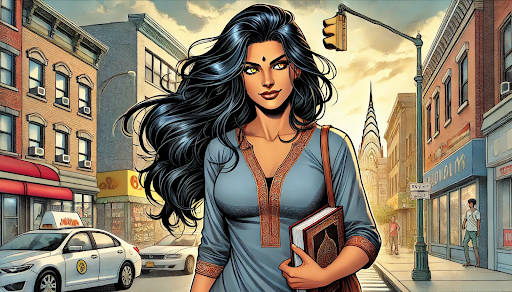Nagini
Background
Indira Saranya Chakravarti was born in Edison, New Jersey, to hardworking Indian immigrant parents who instilled in her a deep appreciation for her cultural heritage and the values of justice and resilience. From a young age, she stood out—not just for her bright golden eyes, which her parents called her “mark of uniqueness,” but for her unwavering sense of right and wrong. While her peers saw her as confident and composed, she often wrestled with feelings of otherness, a longing she could never quite explain.
Her life took an extraordinary turn on her sixteenth birthday. While celebrating with friends, she experienced a near-fatal accident that left her hovering between life and death. In that liminal space, fragments of her past life as Vasukiya, a half-Naga warrior princess, flooded her consciousness. She remembered battles fought against ancient Asuras, her sacrifice to save her people, and the divine legacy that was her birthright. When she awakened, her dormant powers had returned, and her destiny was clear: to protect both worlds from the resurgence of the ancient evil she had once vanquished.
Despite her newfound identity, Indira chose to remain connected to her modern life. She continues to live with her family in Edison, balancing the demands of college life and her duties as a protector. Her journey as Nagini is one of reconciliation—honoring her past while carving out her future as a hero in the modern age.
Personality
Indira is a woman of profound complexity, shaped by both her mortal upbringing and her divine legacy. She carries herself with grace and composure, an air of quiet confidence that stems from her royal Naga heritage. Yet, her modern life has taught her humility; she understands the struggles of ordinary people and is deeply compassionate toward those who cannot defend themselves. Her empathy drives her to act as both protector and guide, particularly for those marginalized or forgotten by society.
At her core, Indira is a warrior bound by a code of honor. Her sense of justice is unwavering, and she has no tolerance for cruelty or oppression. This commitment sometimes places her at odds with the pragmatic methods of others, as she believes deeply in the importance of fighting with integrity. While she is capable of great ferocity in battle, she tempers her strength with wisdom, ensuring that her power is always wielded for the greater good.
Despite her divine origins, Indira values her mortal relationships as a source of grounding and strength. She cherishes her family and friends, finding solace in their love and support, even as she struggles to share the truth of her identity with them. Her queerness is another aspect of her life she embraces without hesitation, viewing her capacity to love as a testament to her humanity.
Indira’s past-life memories sometimes weigh heavily on her, filling her with a sense of responsibility that can be both inspiring and isolating. She strives to balance the expectations of her ancient role as Vasukiya with her modern identity as Indira, knowing that her true strength lies in uniting both aspects of herself. For all her power, she remains deeply introspective, constantly seeking harmony between the two worlds she calls home.
Indira Saranya Chakravarti was born in Edison, New Jersey, to hardworking Indian immigrant parents who instilled in her a deep appreciation for her cultural heritage and the values of justice and resilience. From a young age, she stood out—not just for her bright golden eyes, which her parents called her “mark of uniqueness,” but for her unwavering sense of right and wrong. While her peers saw her as confident and composed, she often wrestled with feelings of otherness, a longing she could never quite explain.
Her life took an extraordinary turn on her sixteenth birthday. While celebrating with friends, she experienced a near-fatal accident that left her hovering between life and death. In that liminal space, fragments of her past life as Vasukiya, a half-Naga warrior princess, flooded her consciousness. She remembered battles fought against ancient Asuras, her sacrifice to save her people, and the divine legacy that was her birthright. When she awakened, her dormant powers had returned, and her destiny was clear: to protect both worlds from the resurgence of the ancient evil she had once vanquished.
Despite her newfound identity, Indira chose to remain connected to her modern life. She continues to live with her family in Edison, balancing the demands of college life and her duties as a protector. Her journey as Nagini is one of reconciliation—honoring her past while carving out her future as a hero in the modern age.
Personality
Indira is a woman of profound complexity, shaped by both her mortal upbringing and her divine legacy. She carries herself with grace and composure, an air of quiet confidence that stems from her royal Naga heritage. Yet, her modern life has taught her humility; she understands the struggles of ordinary people and is deeply compassionate toward those who cannot defend themselves. Her empathy drives her to act as both protector and guide, particularly for those marginalized or forgotten by society.
At her core, Indira is a warrior bound by a code of honor. Her sense of justice is unwavering, and she has no tolerance for cruelty or oppression. This commitment sometimes places her at odds with the pragmatic methods of others, as she believes deeply in the importance of fighting with integrity. While she is capable of great ferocity in battle, she tempers her strength with wisdom, ensuring that her power is always wielded for the greater good.
Despite her divine origins, Indira values her mortal relationships as a source of grounding and strength. She cherishes her family and friends, finding solace in their love and support, even as she struggles to share the truth of her identity with them. Her queerness is another aspect of her life she embraces without hesitation, viewing her capacity to love as a testament to her humanity.
Indira’s past-life memories sometimes weigh heavily on her, filling her with a sense of responsibility that can be both inspiring and isolating. She strives to balance the expectations of her ancient role as Vasukiya with her modern identity as Indira, knowing that her true strength lies in uniting both aspects of herself. For all her power, she remains deeply introspective, constantly seeking harmony between the two worlds she calls home.

Children




Comments